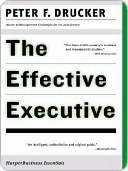The effective decision-maker, therefore, always assumes initially that the problem is generic. He always assumes that the event that clamors for his attention is in reality a symptom. He looks for the true problem. He is not content with doctoring the symptom alone. And if the event is truly unique, the experienced decision-maker suspects that this heralds a new underlying problem and that what appears as unique will turn out to have been simply the first manifestation of a new generic situation.
Welcome back. Just a moment while we sign you in to your Goodreads account.


